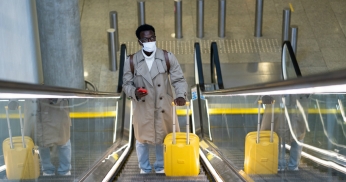 Travel
TravelBaggage delay versus baggage loss insurance: what are you covered for?
You’re planning your next trip — browsing through options for the best hotels, eateries, and destinations &m...

Compare travel insurance quotes.
Finding the best rates on travel insurance is easy at LowestRates.ca. We'll bring you the cheapest rates on travel insurance from all the top providers in your area.






You’ve spent months planning for your big getaway vacation – everything from flight tickets to hotel stays have been booked. As soon as you land, however, you find that the airline lost your luggage. Losing valuable belongings and the hassle of getting new ones can put a damper on your much-awaited trip, and the loss that you incur may be a couple of hundred dollars. But you can rest assured that your insurance company will reimburse you for it if you’ve purchased a travel insurance policy.
However, the stakes could be higher. Not only does travel insurance cover you for lost or delayed baggage, but also prevents you from paying out-of-pocket for expensive health care in a foreign country. An accidental fall can lead to a dislocated shoulder or worse, a medical emergency like a stroke.
Travel insurance includes:
Medical expenses: This includes emergencies that arise during your trip. The insurer will cover hospital bills, diagnostic tests, and medication for something as minor as a fractured ankle to an emergency evacuation. It also includes ambulance costs, being airlifted out of a remote location, or repatriation back to Canada.
Baggage delay or loss of personal items: The insurance provider covers the cost of delayed baggage or damaged personal items.
Trip cancellation or interruption: This coverage reimburses you for costs if you cancel your trip or cut it short. For instance, falling ill before your trip or death of a family member back home. This coverage is usually not offered in standard travel insurance policies and can be purchased as an add-on.
Trip delay: If your flight has been delayed, this coverage reimburses you for accommodation and meal expenses. Depending on the terms of the policy, a minimum amount (six to 12 hours) of delay is required to be eligible for this coverage.
Travel insurance policies do not cover:
Pre-existing health conditions.
Routine dental or medical appointments.
Cosmetic procedures.
High-risk activities like adventure sports.
Destinations that the Canadian travel advisory lists as “Avoid non-essential travel” and “Avoid all travel,” because of the risk involved.
As a prerequisite to entry or obtaining a visa, some countries – Bhutan, Qatar, and the Schengen visa required for Europe, for example – mandate purchasing travel insurance.
The Canadian government advises all travellers to purchase travel insurance. Not only for international trips, but even within Canada, as provincial healthcare may not be sufficient to cover gaps in coverage.
Whether you are travelling for work or pleasure, are a snowbird or a digital nomad, a frequent flyer or going on your first trip, consider travel insurance as an investment in your safety. While it may not seem necessary, it’s there to protect you and provide peace of mind while abroad.
You should ideally, purchase travel insurance ahead of your trip. However, don’t just opt for the first insurance provider that you stumble across. When shopping for travel insurance, be sure to determine the type of coverage you require, policy coverage limits, inclusions and exclusions, and the policy deductible.
At LowestRates.ca, all you have to do is enter a few details about yourself and your trip, and we will find the cheapest travel insurance rates from a wide range of insurance companies.
But don’t just take it from us.
Its worth taking some time to read through the terms of the policy to make sure you are getting the lowest travel insurance quote that is best suited to your needs.
In the world of insurance, there’s no ‘one-size-fits-all.’ The good news is that you can customize your travel insurance policy and opt for coverage that is best suited to your needs.
Type of travel insurance | What it covers and benefits |
|---|---|
Single-trip travel insurance | Emergency medical coverage for one trip, which you can take anytime within a 365-day period. |
Multi-trip or annual travel insurance | Emergency medical coverage for any number of trips taken within one year. |
Trip cancellation and interruption insurance | Insurance coverage that reimburses you for pre-booked flights, hotel stays, and other travel expenses if you have to cancel your trip for a covered reason. For instance, if your tour operator suddenly files for bankruptcy. |
Comprehensive travel insurance or all-inclusive travel insurance | A comprehensive policy offers emergency medical coverage plus insurance against logistical problems, like lost or stolen baggage, trip cancellations, and travel interruptions. |
Top-up insurance | Travel insurance coverage for travellers who have insurance for a portion, but not for the entire duration, of their trip. |
After-departure insurance | Some insurance companies offer the option of purchasing travel insurance after you’ve left for your trip. It’s not a regular offering because it raises a lot of red flags for risk-averse insurers whose priority is to safeguard against fraudulent claims, and medical costs in a foreign country can be expensive. |
Travel insurance doesn’t have to be expensive.
We used our travel insurance quoter to find out the cost of travel insurance. The best rate per trip for:
A single,
non-smoking,
40-year-old male traveller
on a 10-day trip to the United States
with no pre-existing health conditions,
$5 million in coverage,
and a $0 deductible
is $28.
While travel insurance quotes will vary depending on the coverage one opts for, insurers use certain factors to calculate the rate. These include:
Age
The number of people the travel insurance policy will cover
The duration of the trip
The total cost of the trip
Amount of coverage required
Amount of deductible
When compared to the hefty bills that you would be paying out-of-pocket if something one runs into a medical emergency in the US, about 30 bucks is a small amount to pay.
One way to make sure you’re getting the lowest rate available for your coverage requirements is to compare travel insurance quotes across various providers. A quick three-minute exercise can save you hundreds of dollars that you would otherwise potentially shell out on travel insurance.
Travel insurance doesn’t have to be expensive. Find the cheapest insurance rates from a wide range of insurance companies.
Our travel insurance quoter is 100% free to use. So, finding the best travel insurance quotes won’t cost you a dime.
At LowestRates.ca, we bring you the top travel insurance providers – all competing for your business on a level-playing field.
Your personal information will never be given to a third-party. We only ask for the details we need to find you the best travel insurance quotes.
There are perks to shopping for travel insurance with us. On top of getting the best rates, the process is quick – it only takes 3 minutes. And did we mention it’s free?
One or two quotes won’t do. Get multiple travel insurance quotes from all the top insurers in your area.
No rocket science here – just provide us with a few quick details about yourself and type of travel you intend on doing and leave the hard part to us.
Finding the lowest rates on travel doesn’t take long. Actually, it only takes 3 minutes. All you need to do is provide a few details about yourself and your trip.
Before purchasing travel insurance, it’s important to understand what coverage you will be receiving. Be sure to read the fine print or speak with your insurance provider to understand what may and may not be covered.
Here’s a quick checklist that can help you with the travel insurance purchase process.
What does the travel insurance policy cover?
What are the exclusions of the travel insurance policy?
What are the limitations on the policy? For instance, if opting for multi-trip insurance, what are the number of days that you will be covered for on one particular trip?
How much is the deductible on the travel insurance plan?
What are the limits on medical emergencies?
Can I extend my insurance coverage from abroad if I extend my trip?
If travelling within Canada, what is covered under my provincial health plan? And what is not covered?
Inquire about add-ons to your policy – can I get a rider or endorsement for adventure sports?
What if I have a pre-existing health condition? Does that mean I am not eligible for travel insurance?
What if someone covered under my policy has a pre-existing health issue?
Do I have to fill out a health questionnaire?
What if an epidemic breaks out in the destination? Will the plan provide coverage?
What if the government of Canada issues a travel advisory while I am in the destination? Will my travel insurance plan provide coverage?
Will the plan cover repatriation costs?
Does the insurance company offer worldwide emergency assistance 24-hours and 7 days a week? How can I reach the company if there is a medical emergency? Who do I call? Are there translation services for providers in the country you are travelling to?
How do I file a claim? Is the claims process easy and straightforward?
Does the plan have direct billing, or do I have to pay for bills upfront?
International travel is fun and exciting, but it can also be unpredictable.
Often times you’re operating in a different culture, in a different language, and with a different medical system. Whether it’s damaged luggage or a serious health emergency, travel insurance can help keep you safe if things go wrong while you’re away from home.
Travel insurance is likely the last thing on your mind while you’re mapping out your getaway, but medical emergencies and logistical snafus can happen anywhere. So, it’s a good idea to buy a policy that covers you. We’ll help you compare offers from Canada’s leading travel insurance providers and bring you the cheapest travel insurance possible.
We bring you the best rates from the top travel insurance providers. Simply provide a few, quick details about you and your trip, then click ‘Compare’ to see the best travel insurance quotes available. And just like that, you have the cheapest rate for your travel insurance coverage requirements.
The short answer is probably not. Most insurance companies will not allow you to purchase coverage for your vacation while you’re on said vacation.
But who decides when a vacation officially begins, anyway? If you’re travelling by plane, for instance, some insurers might say your vacation begins when you’ve gone through customs. For others, it might begin as soon as you check-in at the airport.
There’s no universal standard, so it may be worth a quick call to your insurance provider to clarify.
Most companies will let you purchase insurance up until the day before your departure – you may even be able to purchase it on the day of (in your Uber, on the way to the terminal). If you’ve already left your home province, a smattering of insurers offer after-departure insurance. But this kind of policy typically comes with a heavy list of conditions, and it can be pricey.
Generally speaking, don’t leave insurance-buying until the last minute. But if you do, call your insurer and see what they can offer you. Better late than never.
Yes, you need travel insurance for trips within Canada.
Why? Because while you are covered under your home province’s health care plan when you travel out of province, your coverage will be limited. Every provincial health care system is different, and the cost of medical procedures varies by province. That means if you require health care while travelling within Canada, your existing coverage will only pay the equivalent of what that medical service would cost in your home province.
For example, an Ontarian who requires emergency surgery in British Columbia will only be covered for what that surgery costs in Ontario, and you may be forced to pay thousands of dollars more to make up the difference.
Your provincial plan also does not cover the following services while you’re out-of-province: Prescription drugs Dental emergencies Medical transportation back home Emergency air or ground transportation While some provinces have billing agreements, not all of them do. That’s why it’s important to stay covered even inside Canada. Travel insurance is an affordable alternative to the costs you could incur if you experience a medical emergency.
Your provincial plan also does not cover the following services while you’re out-of-province:
Prescription drugs
Dental emergencies
Medical transportation back home
Emergency air or ground transportation
While some provinces have billing agreements, not all of them do. That’s why it’s important to stay covered even inside Canada. Travel insurance is an affordable alternative to the costs you could incur if you experience a medical emergency.
The simple answer is yes: your property is covered by your insurance policy, but only up to a certain dollar amount. Even within the same policy, coverage can vary depending on the item. For example, the amount of coverage that a policy extends to electronics might be different than the coverage you’ll get for sports equipment
Keep in mind that there are often specific items that insurance companies won’t cover. Make sure to check what these items are with your insurance provider.
If you didn’t get travel insurance and your items are stolen, it becomes more challenging, but not impossible, to get reimbursed. If your belongings were stolen at a hotel, and it can be proven that the hotel was at fault, the establishment will compensate you up to a certain amount. If items are missing from your checked-in luggage after a flight, most airlines will allow you to file a claim with them.
A comprehensive policy that offers emergency medical coverage plus insurance against logistical problems, like lost or stolen baggage, trip cancellations, and travel interruptions. Since all inclusive insurance has the most extensive coverage, premiums tend to be higher than for other travel policies.
This insurance reimburses you for your flight and travel expenses if you have to cancel your trip for a covered reason. Some policies also pay benefits for food and lodging costs if your trip is interrupted or delayed. Those policies may even cover you if your tour operator suddenly files for bankruptcy.
Emergency medical coverage for one trip, which you can take any time within a 365-day period.
Emergency medical coverage for any number of trips taken within 1 year. Also known as annual travel insurance.
Purchased by travellers who already have insurance for a portion, but not for the entire duration, of their trip. Top-up insurance takes effect after the original coverage lapses.
Few insurance companies offer insurance that covers you when you’ve already left for vacation. Why? It raises a lot of red flags for risk-averse insurers whose priority is to guard against fraudulent claims — medical costs in foreign countries can be expensive. For your application to be accepted, you must not have seen a doctor since departing, you must not be showing symptoms of illness, and you must be covered under a provincial health insurance plan.
"

Shaistha Khan
About the Author
Shaistha Khan is a freelance writer in the personal finance space. She is a journalist, writer, and communications specialist with 12 years of experience across the oil and gas, business and professional development, and travel and tourism industries. She has lived in Saudi Arabia for nearly three decades, and reported on some of the first-ever events in the country. She has also reported from the United Arab Emirates, Bahrain, Qatar, India, and Houston, USA. Her work has been published in BBC Travel, USA Today, Al Jazeera, Teen Vogue, Travel + Leisure, Lonely Planet, Vogue Arabia, and several in-flight magazines. She has also worked with tourism boards and hotel chains on sponsored content.
She holds a Master of Business Administration degree (MBA) and a diploma in Public Relations and Reputation Management.
"
 Travel
TravelYou’re planning your next trip — browsing through options for the best hotels, eateries, and destinations &m...
 Travel
TravelCOVID-19 has changed the way we travel — possibly forever — and as global cases continue to rise and we find...